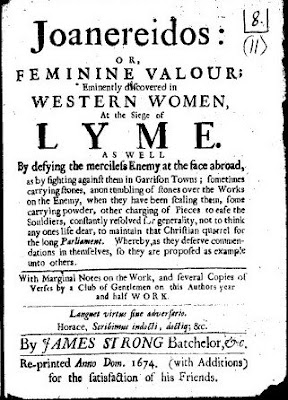
This poem in commemoration of the courage of the women of Lyme [Regis] during the royalist siege of the town in 1644 eventually got to the press thirty years later.
It has to be said that James Strong was a very bad poet. Here, he describes how the women in the godly town undergoing siege rebuilt the defences, if a breach was made in the fortifications:
“This Amazon-like train vows ne’r to stoop
Being fled from Venus unto Mars his troop,
Where they with tumors, tost, Truths standard bear,
And Sions downfaln breaches strive to rear:
They stop the gap themselves…”
His religious enthusiasm is very apparent (and his Dorset accent):
“A saint-like sort of Females as before,
Earths broad Horrison till now ne’re bore.
From heaven are fallen, O let’s not be dull
To write their worth whereof the West is full.
New natur’d are they and their grace divine,
Come let’s embalm their faces, and eke enshrine
Their worth with honour…”
By 1674, Strong was safely established as having been on the wrong side. The volume in which his wretched poem appeared is extraordinary, as it is prefixed by a long series of savage mock-commendatory poems, vilifying the godly versifier (in detail) as a wife-beater, and for his ignorance, ingratitude, smelly feet, etc. He is represented as a writer who “with a mouth brim-full / Of spumy froth spits praises on that sex”.
The mock-commendations appear in a full comedy of macaronic language: burlesque Chaucerian and parody medieval French, take-offs of West Country dialect, Scots, obscene Welsh, and Latin. In several places, the gentlemen poets are reminded of the fun that was had when Thomas Coriat was being ragged for his Crudities, which supplies the model for extensive mock-encomiastic verse about a text considered badly written, but this time round carried out with an odium heightened by Strong’s politics, and because his praise was directed at the courage of lower class women.
Strong’s poem, when you finally reach the text, is also given a facetious annotation:
“Doth noble Portia or Lucretia* strive
For chastity this praise us to deprive…
*A Popish Roman Dame that stabd her self for one Raph. See The Knight of the burning Pestle.”
I quite like Lucrece as ‘Popish’ (because Roman), and the mock-reference to Beaumont’s comedy. Strong saw the besieged in Lyme as resisting the forces of the whore of Babylon, and annotator comments archly on his typically ill-considered phrasing:
“Who though the crimson whore** seek to deflowr,
And spoyl this Virgin vertue every hour.
Let each day testifie how they refuse
Her whorlsh proffers, and do rather choose
To sacrifice their blood to Christ their Bride,
Then with Romes Idols to be stuprifide.
This makes Romes beasts to foam with rage
'Cause we hold fast that knot of Marriage
With Christ our Husband, and will not defile
Our milk-white garments with his whoredoms vile.
** It seems this whore is an Hermophrodite else the feat could not be done.”
The courtier poet Sir Aston Cokain, in his A chain of golden poems embellished with wit, mirth, and eloquence : together with two most excellent comedies (1658) also has another stray mock commendation, very much in the same vein:
“As Coriate did exceed for writing Prose;
So thou for penning an Heroick Song
Dost all surpass; In meeter being James Strong...”
http://www.lymeregismuseum.co.uk/rebellion.htm

No comments:
Post a Comment